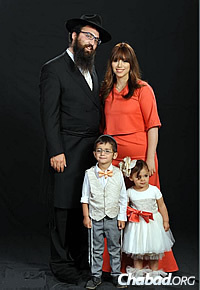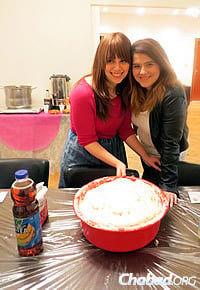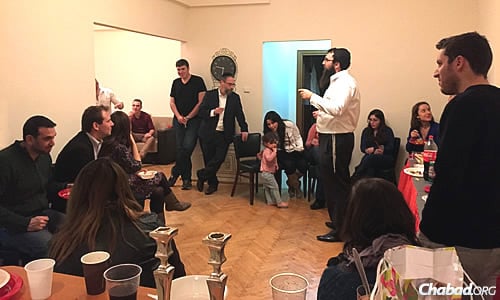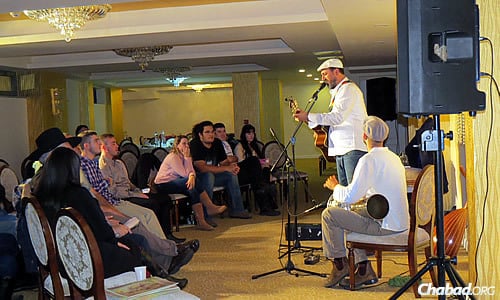When Ran Frenkel moved from Ra’anana, Israel, to Bucharest last summer to begin his medical studies, he had no idea what he’d find in terms of Jewish life in the Romanian capital.
“Israel is a place where you don’t have to try very hard to be Jewish. I knew Romania would be 180 degrees from that, but I didn’t really know what to expect,” says the 28-year-old.
Luckily, Frenkel’s move roughly corresponded with Rabbi Dovber and Fraidy Orgad’s arrival in Bucharest, where they relocated this past August in order to establish a Chabad on Campus “home away from home” for some 200 Israeli medical students, like Frenkel, who are currently studying in Bucharest.
The Orgads both grew up in Kfar Chabad, Israel, where they married in 2010. They have a 4-year-old son, Schneur Zalman, and a 2-year-old daughter, Chaya Mushka.
Becoming shluchim, or Chabad emissaries, was a “dream” for both of them, they say. Fraidy Orgad, 23, had volunteered at Jewish summer camps in Israel while in high school, and Rabbi Orgad, 28, had worked with shluchim serving communities in Southampton, N.Y.; Moscow; and Belarus during his rabbinical studies.
The couple worked in Israel after getting married: Fraidy as a first-grade teacher in a public school, and the rabbi as a manager of popular local wedding hall.

“My dream was to go to the Kinus Hashluchim as a shaliach,” Rabbi Orgad says, referring to the International Conference of Chabad-Lubavitch Emissaries that takes place every fall in New York.
Last spring, they heard of the opportunity in Bucharest, and within a few weeks had traveled to the city. It was their first trip abroad as a married couple.
‘Students Are the Future’
Approximately 3,200 Jews live in Romania, according to a 2011 census, but the numbers have increased in recent years as Israelis have moved to Bucharest to work and study in the capital.
Rabbi Naftali and Risha Deutsch, co-directors of Chabad Lyubavitsh of Romania, moved to Bucharest in 1999, establishing a Chabad center with a synagogue, preschool, mikvah and other Jewish services.
Rabbi Deutsch says working with students in Bucharest and other cities, such as Cluj and Iasi, has been a key component of Chabad’s activities in Romania from the outset.
“Students are the future,” states the rabbi in no uncertain terms. In recent years, he and his wife decided to seek a couple to work directly with the students. After interviewing potential shluchim for more than a year, they met the Orgads, whom they felt would be just the right fit.
“The Orgads have a lot of energy, they know how to work, and they have experience. I’m very happy with how many students they’ve gotten to know in just three months.”

‘Come, Talk, Feel Like Family’
The Orgads moved to Bucharest with their two young children in August, and immediately set out to find an apartment that would serve as both their home and as a home base for student programming. After a few weeks, they found an apartment large enough to host students for Shabbat meals and other events, and centrally located to the medical campus.
They kicked off their programming with an event for the start of the school year. The turnout was modest, but the Orgads were undaunted, and as word spread, they soon had 20 or 30 students turning out for their events.
Last month, they hosted a party featuring Israeli actor Golan Azulay, who spoke about his journey to becoming religious. This week, they’re in the midst of celebrating their first Chanukah in Romania.
Much of the interaction between the Orgads and students has been informal, connecting during intimate Shabbat meals and over coffee during the week.
“One of the important reasons we are here is just to listen,” says Rabbi Orgad. “A lot of students are far from family, far from Israel, far from their culture. Their studies are difficult, and they just need someone to listen to them. They have a home here, where they can come to talk and feel like family. That’s the best thing we can offer them.”

Fraidy points out that the Israeli student community has been isolated, with few opportunities in their busy schedules to meet and socialize. “We’re focusing on unity,” she adds. “We really want to make a student community, so that they will all be connected, to support each other.”
Ran Frenkel agrees, saying “it’s a great way to meet students. I only knew one or two other Israeli students before, but I’ve met a lot more through their events.”
Fraidy adds that it requires persistence to reach out to the busy medical students, who juggle classes, study sessions and exams. “When they tell me they have tests and can’t come, I say: ‘I’m not giving up on you. Come next week!’ ”
Frenkel’s fiancée, Bareket Baron, 21, moved this past summer from Holon, Israel, to Bucharest, where she is completing premedical studies. She has regularly joined the Orgads for Shabbat meals, sometimes sleeping over at their apartment.
“The Shabbats we spent with them were amazing. It really helped you to feel you’re home like with your family,” she says.

Both Frenkel and Baron are looking forward to a student Shabbaton the Orgads are planning this winter, to be held over a weekend in the mountains outside of Bucharest. They think it will be a great opportunity to take a break from studying and connect with fellow Jewish students.
Frenkel says he has just one suggestion for the Orgads: “If Chabad could send some shluchim to do my exams for me, I’d be very glad!”







Start a Discussion